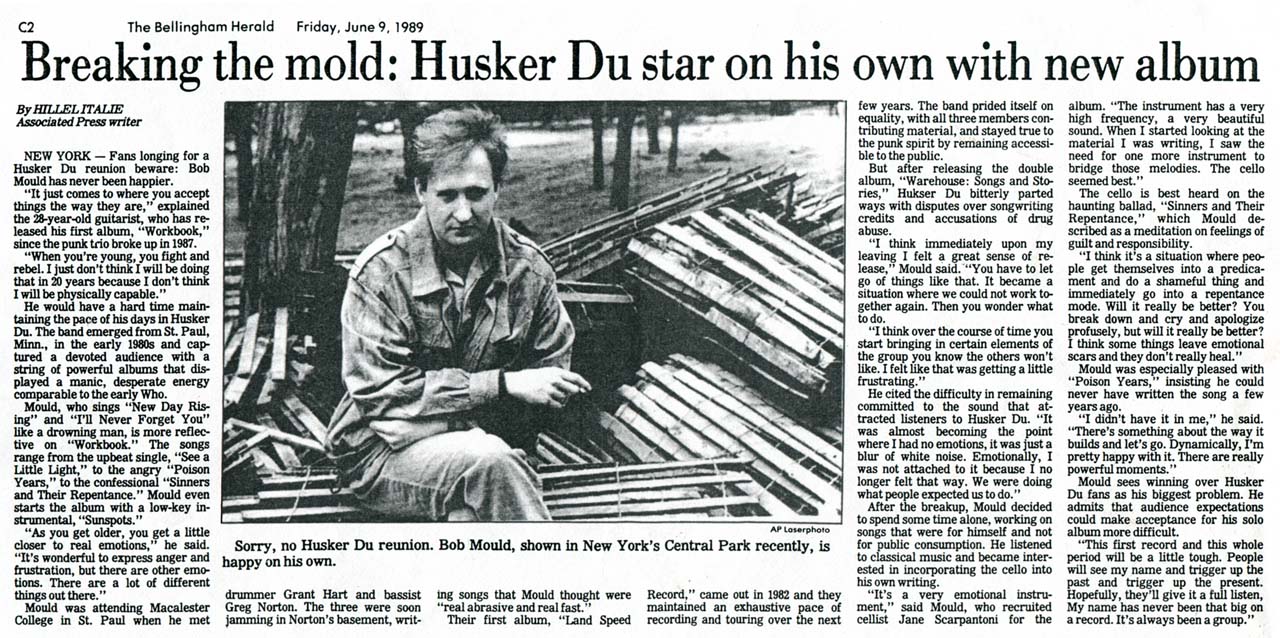
|
This wire service story was published in the Bellingham [WA]
Herald, 09 Jun 1989.
|

|
Breaking the Mold: Husker Du star on his own with new albumBy HILLEL ITALIEAssociated Press writer
NEW YORK — fans longing for a Husker Du reunion beware: Bob Mould
has never been happier.
| "It just comes to where you accept things the way they are," explained the 28-year-old guitarist, who has released his first album, "Workbook," since the punk trio broke up in 1987. "When you're young, you fight and rebel. I just don't think I will be doing that in 20 years because I don't think I will be physically capable." He would have a hard time maintaining the pace of his days in Husker Du. The band emerged from St. Paul, Minn. in the early 1980s and captured a devoted audience with a string of powerful albums that displayed a manic, desperate energy comparable to the early Who. Mould, who sings "New Day Rising" and "I'll Never Forget You" like a drowning man, is more reflective on "Workbook." The Songs range from the upbeat single, "See a Little Light" to the confessional "Sinners and Their Repentance." Mould even starts the album with a low-key instrumental, "Sunspots." "As you get older, you get a little closer to real emotions," he said. "It's wonderful to express anger and frustration but there are other emotions. There are a lot of different things out there." Mould was attending Macalester College in St. Paul when he met drummer Grant Hart and bassist Greg Norton. The three were soon jamming in Norton's basement, writing songs that Mould thought were "real abrasive and real fast." Their first album, "Land Speed Record," came out in 1982 and they maintained an exhaustive pace of recording and touring over the next few years. The band prided itself on equality, with all three members contributing material, and stayed true to the punk spirit by remaining accessible to the public. But after releasing the double album, "Warehouse: Songs and Stories," Husker Du bitterly parted ways with disputes over songwriting credits and accusations of drug abuse. "I think immediately upon my leaving I felt a great sense of release," Mould said. "You have to let go of things like that. It became a situation where we could not work together again. Then you wonder what to do. "I think over the course of time you start bringing in certain elements of the group you know the others won't like. I felt like that was getting a little frustrating." He cited the difficulty in remaining committed to the sound that attracted listeners to Husker Du. "It was almost becoming the point where I had no emotions, it was just a blur of white noise. Emotionally, I was not attached to it because I no longer felt that way. We were doing what people expected us to do." After the breakup, Mould decided to spend some time alone, working on songs that were for himself and not for public consumption. He listened to classical music and became interested in incorporating the cello into his own writing. "It's a very emotional instrument," said Mould, who recruited cellist Jane Scarpantoni for the album. "The instrument has a very high frequency, a very beautiful sound. When I started looking at the material I was writing, I saw the need for one more instrument to bridge those melodies. The cello seemed best." The cello is best heard on the haunting ballad, "Sinners and Their Repentance," which Mould described as a meditation on feelings of guilt and responsibility. "I think it's a situation where people get themselves into a predicament and do a shameful thing and immediately go into a repentance mode. Will it really be better? You break down and cry and apologize profusely, but will it really be better? I think some things leave emotional scars and they don't really heal." Mould was especially pleased with "Poison Years," insisting he could never have written the song a few years ago. "I didn't have it in me," he said. There's something about the way it builds and lets go. Dynamically, I'm pretty happy with it. There are really powerful moments." Mould sees winning over Husker Du fans as his biggest problem. He admits that audience expectations could make acceptance for his solo album more difficult. "This first record and this whole period will be a little tough. People will see my name and trigger up the past and trigger up the present. Hopefully, they'll give it a full listen. My name has never been that big on a record. It's always been a group." |
Back to Hüsker Dü magazine articles page
Back to Hüsker Dü database main page